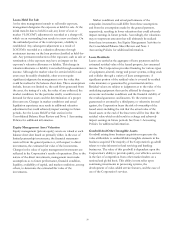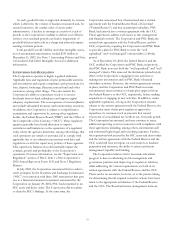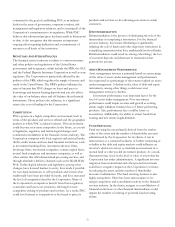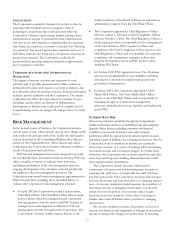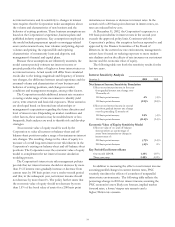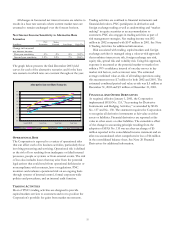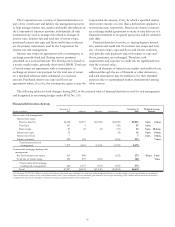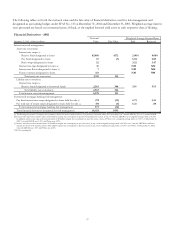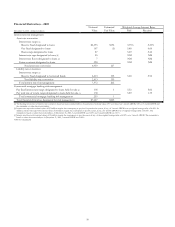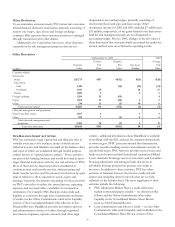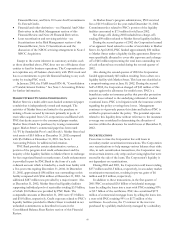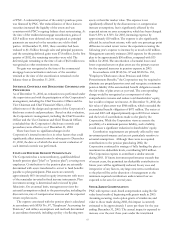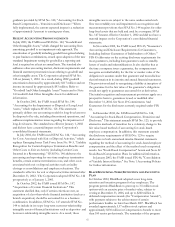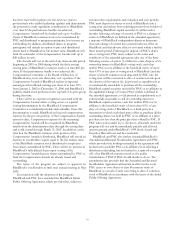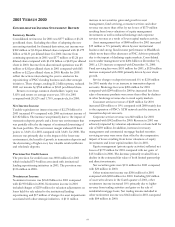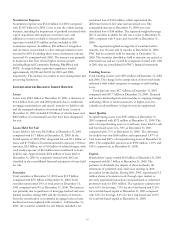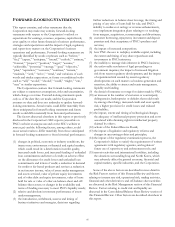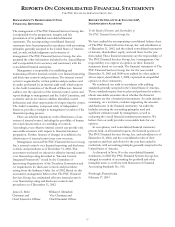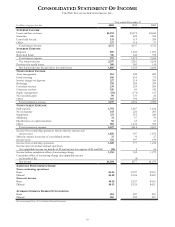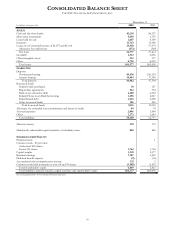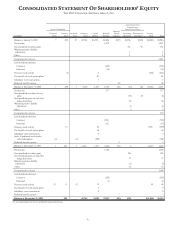PNC Bank 2002 Annual Report Download - page 62
Download and view the complete annual report
Please find page 62 of the 2002 PNC Bank annual report below. You can navigate through the pages in the report by either clicking on the pages listed below, or by using the keyword search tool below to find specific information within the annual report.60
Financial Review, and Note 10 Loans And Commitments
To Extend Credit.
• Financial and other derivatives - see Financial And Other
Derivatives in the Risk Management section of this
Financial Review and Note 20 Financial Derivatives.
• Loan securitization and servicing activities - see
Securitizations in the Risk Management section of this
Financial Review, Note 15 Securitizations and the
discussion of the NBOC servicing arrangement in Note 2
NBOC Acquisition.
Except to the extent inherent in customary activities such
as those described above, PNC does not use off-balance sheet
entities to fund its business operations. The Corporation does
not capitalize any off-balance-sheet entity with PNC stock and
has no commitments to provide financial backing to any such
entity by issuing PNC stock.
In January 2003, the FASB issued FIN 46, “Consolidation
of Variable Interest Entities.” See Note 1 Accounting Policies
for further information.
MARKET STREET FUNDING CORPORATION
Market Street is a multi-seller asset-backed commercial paper
conduit that is independently owned and managed. The
activities of Market Street are limited to the purchase or
making of loans secured by interests primarily in pools of
receivables acquired from U.S. corporations unaffiliated with
PNC that desire access to the commercial paper market.
Market Street funds the purchases by issuing commercial
paper. Market Street’s commercial paper has been rated
A1/P1 by Standard & Poor’s and Moody’s. Market Street had
total assets of $3.0 billion at December 31, 2002 compared
with $5.2 billion at December 31, 2001. See Note 1
Accounting Policies for additional information.
PNC Bank provides certain administrative services, a
portion of the program-level credit enhancement and the
majority of the liquidity facilities to Market Street in exchange
for fees negotiated based on market rates. Credit enhancement
is provided in part by PNC Bank in the form of a cash
collateral account which is funded by a credit loan facility with
a five-year term expiring December 31, 2004. At December
31, 2002, approximately $96 million was outstanding on this
facility compared with $166 million at December 31, 2001. An
additional $287 million was provided by a major insurer. Also
at December 31, 2002, Market Street had liquidity facilities
supporting individual pools of receivables totaling $3.9 billion,
of which $3.2 billion was provided by PNC Bank. The
comparable amounts at December 31, 2001 were $7.0 billion
and $5.8 billion, respectively. Credit exposure related to PNC’s
liquidity facilities provided to Market Street is included in net
unfunded commitments as described in Loans in the
Consolidated Balance Sheet Review section of this Financial
Review.
As Market Street’s program administrator, PNC received
fees of $13.9 million for the year ended December 31, 2002.
Commitment fees related to PNC’s portion of the liquidity
facilities amounted to $7.5 million for full year 2002.
Net charge-offs during 2002 included two charge-offs
totaling $90 million related to Market Street liquidity facilities.
During the second quarter of 2002 the Corporation learned
of an apparent fraud related to a seller of receivables to Market
Street. In April 2002, PNC funded approximately $50 million
to Market Street under a liquidity facility agreement. Reserves
were specifically allocated to cover this exposure and a charge-
off of $45 million representing the total loan outstanding net
of cash collateral was recorded during the second quarter of
2002.
Also during the second quarter of 2002 the Corporation
funded approximately $63 million resulting from a draw on a
liquidity facility with Market Street. This loan was classified as
a nonperforming asset at June 30, 2002. During the second
half of 2002, the Corporation charged off $45 million of this
amount against the allowance for credit losses. PNC is a
beneficiary under an insurance policy that provides protection
against losses related to the underlying collateral of student
vocational loans. PNC is in litigation with the insurance carrier
regarding the policy covering these losses. Management
continues to vigorously pursue this claim and believes PNC is
entitled to payment under the policy. The potential exposure
related to this liquidity draw without reference to the insurance
coverage was considered in determining the allocation of
reserves within the allowance for credit losses at December 31,
2002.
SECURITIZATIONS
From time to time the Corporation has sold loans in
secondary market securitization transactions. The Corporation
uses securitizations to help manage various balance sheet risks.
Also, in such securitization transactions, the Corporation may
retain certain interest-only strips and servicing rights that were
created in the sale of the loans. The Corporation’s liquidity is
not dependent on securitizations.
During 2002 and 2001, the Corporation sold loans totaling
$277 million and $1.5 billion, respectively, in secondary market
securitization transactions, resulting in pre-tax gains of $6
million and $13 million, respectively.
In addition to these transactions, in the first quarter of
2001 PNC securitized $3.8 billion of residential mortgage
loans by selling the loans into a trust with PNC retaining 99%
or $3.7 billion of the certificates. PNC also securitized $175
million of commercial mortgage loans by selling the loans into
a trust with PNC retaining 99% or $173 million of the
certificates. In each case, the 1% interest in the trust was
purchased by a publicly-traded entity managed by a subsidiary


